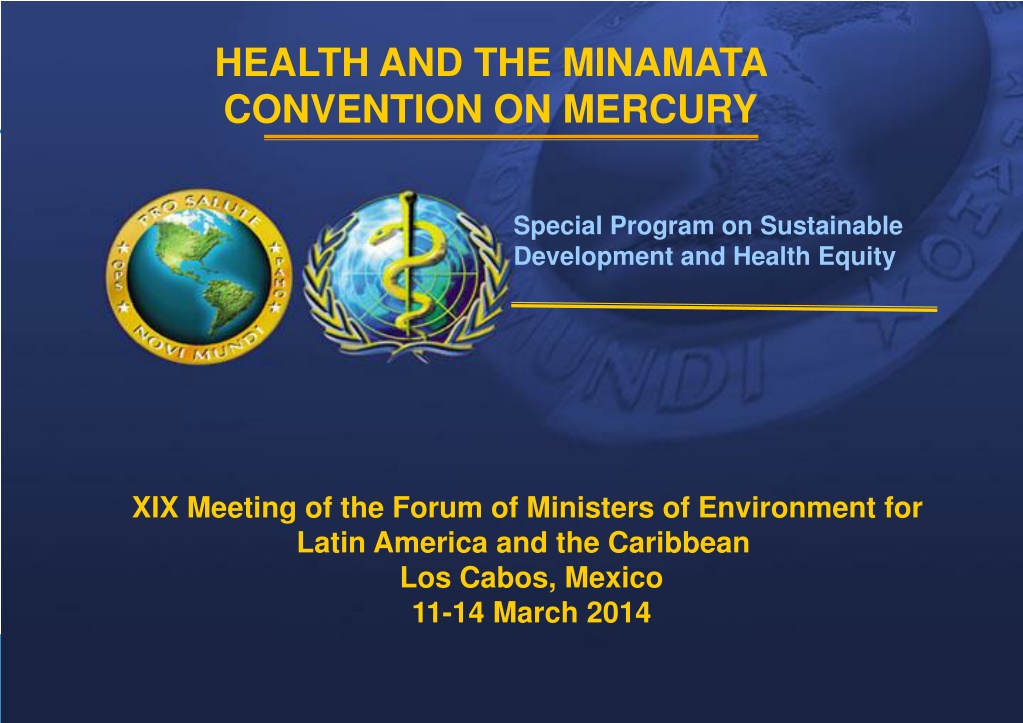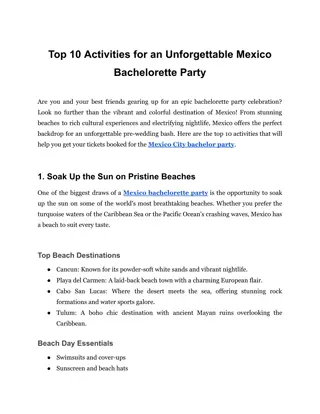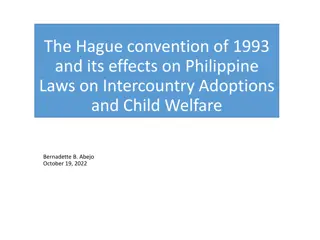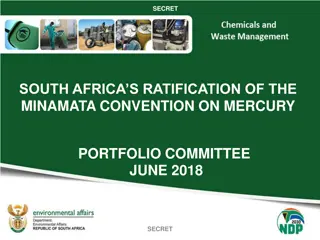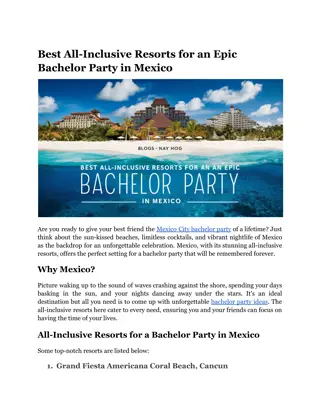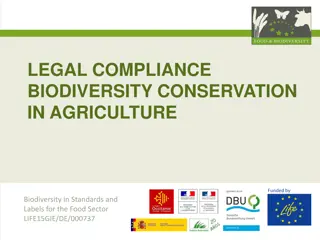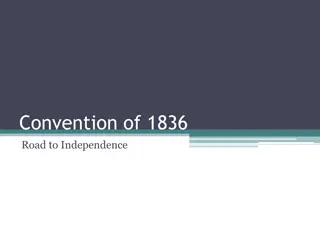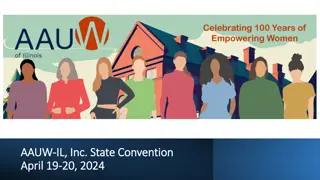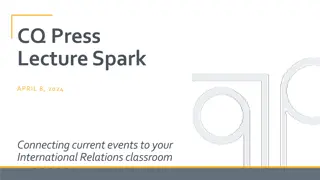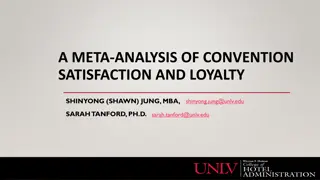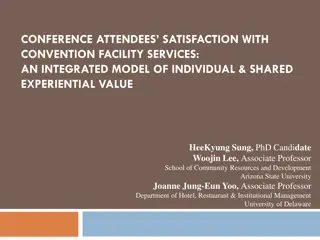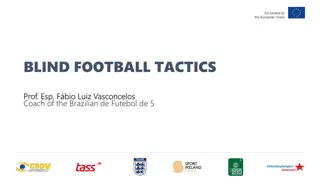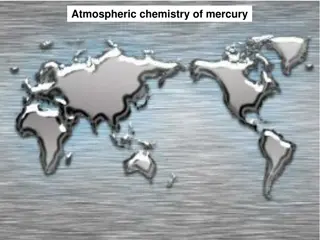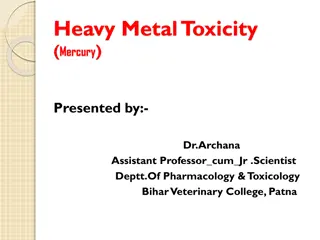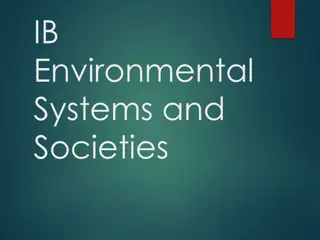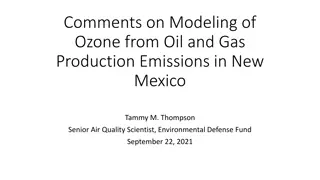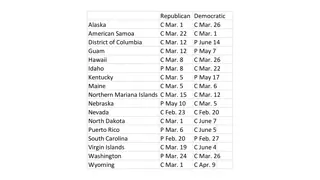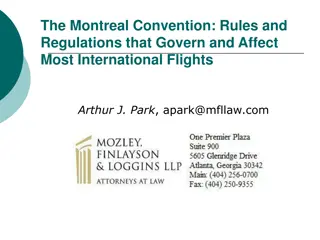Promoting Health and Sustainability: The Minamata Convention on Mercury
The Minamata Convention on Mercury addresses the health impacts of mercury exposure, particularly on vulnerable populations like children and workers. It emphasizes the phase-out of mercury-containing devices by 2020 and highlights success stories of countries in the Americas going mercury-free. Strategies are proposed for artisanal gold mining and contaminated sites. The program aims for sustainable development and equity in health, with a focus on protecting human health from the dangers of mercury exposure.
Download Presentation

Please find below an Image/Link to download the presentation.
The content on the website is provided AS IS for your information and personal use only. It may not be sold, licensed, or shared on other websites without obtaining consent from the author. Download presentation by click this link. If you encounter any issues during the download, it is possible that the publisher has removed the file from their server.
E N D
Presentation Transcript
HEALTH AND THE MINAMATA CONVENTION ON MERCURY Special Program on Sustainable Development and Health Equity XIX Meeting of the Forum of Ministers of Environment for Latin America and the Caribbean Los Cabos, Mexico 11-14 March 2014 1|
MERCURY HEALTH IMPACTS Threat to the development of the child in utero and early in life. In subsistence fishing populations, between 1.5/1000 and 17/1000 children showed cognitive impacts. Toxic to the nervous, digestive and immune systems, as well as the lungs, kidneys, skin and eyes. Adults are affected through occupational and consumer exposures. 2 |
DIRECT EXPOSURE TO PEOPLE Through their work (e.g. health workers, miners) in contaminated sites in consumer product usage 3 |
LEGALLY BINDING PHASE OUT BY 2020 (Article 4) Mercury blood pressure measuring devices Mercury fever thermometers 4 |
Part of UN Environment Programme's (UNEP) Mercury Products Partnership, lead by the US Environmental Protection Agency. Guidance documents (WHO/PAHO Guidelines for thermometers and sphygmomanometers replacement) Technical and policy support for hospitals, health services and ministries of health and environment Success stories: Countries in the Americas committed or already mercury-free: Argentina, Brazil, Chile, Costa Rica, Nicaragua, Mexico 5 |
ARTISANAL AND SMALL-SCALE GOLD MINING (ASGM) (Article 7) Development of public health strategies to address the health impacts of mercury use in ASGM (required for countries that have "more than insignificant" ASGM) WHO/PAHO participation on UNEP Global and Regional Fora on ASGM to follow up on the health strategy 6 |
MERCURY CONTAMINATED SITES (Article 12) Human health risk assessment to inform on actions to reduce risks 7 |
HEALTH INFORMATION (Articles 17, 18, 19) Public awareness-raising, exchanging health information, health research, and health monitoring 8 |
HEALTH ASPECTS (Article 16) Health programs to protect vulnerable populations at risk from exposure to mercury, provision of health care (in the context of WHO/PAHO priority universal health coverage) WHO invited to provide information to COP on Article 16 and others Capacity building health sector and multi sector collaboration- www.paho.org/toxicology 9 |
THE ROLE OF WHO INCLUDING THE WORLD HEALTH ASSEMBLY Convention preamble recognizes the role of WHO, references to collaboration with WHO and IGOs in the Convention Diplomatic Conference resolution on the Convention invites WHO to support implementation of the Convention WHO Executive Board recommended the 67th World Health Assembly in May 2014 pass a resolution on the role of WHO and ministries of health in implementation of the Convention 10 |
ACTIONS ON MULTI SECTORIAL COLLABORATION Ministers of Health and Environment key areas for joint collaboration agenda: Phase out of mercury blood pressure measuring devices and mercury fever thermometers guidelines for replacement (WHO/PAHO and countries), inventories and storage (UNEP and countries) ASGM health strategy (WHO/PAHO and countries) in the national action plan (UNEP and countries); expand universal health coverage for mining settings PAHO and the Amazon Cooperation Treaty Organization project with BID 11 |
Thanks for your attention For more information Ana Boischio, PhD, MSc - boischioa@paho.org Regional advisor in Toxicology Special Program on Sustainable Development and Health Equity 12 |
